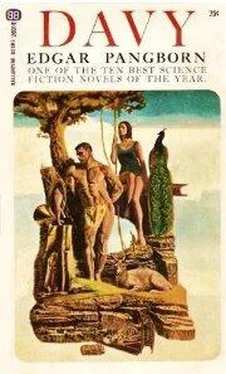Yes, I stayed with that place Minna picked for me, making a home for myself out of a hole four feet by eight by seven, learning how to live cramped in small ways but not in large — unless you want to say that we’re all bound to be cramped in a moment of time that rarely reaches even a century, on a speck of stardust that’s been precariously spinning in nothing for a mere pitiful three or four billion years. I was also learning how few important material possessions there are that can’t be readily stowed in four-by-eight-by-seven, leaving room for yourself, and now and then for Minna.
I came to Levannon and the ships, and I did not sail.
What is it, this very certain destiny that overtakes all our visions, our most reasoned plans equally with our fantastic dreams? Maybe whenever we think of the future, as we must if we’re to be human at all, the act is bound to include a something-too-much, as if with all due human absurdity we were expecting chance to alter its course at the impact of our noise. A boy imagined the great outriggers, the fine thirty-tonners bound east by the northern route; his mind saw their canvas tall, mighty, luminous in a golden haze. A young man in the late summer of 317, the least important member of a Rambler gang he’d never heard of a month earlier, came off the flat-bottomed ferrysailer into the reeking port of Renslar in Levannon, helping old Will Moon wrangle the mules. I suppose he was possibly a quarter-inch taller than when he took hold of Emmia Robson in the way of love. When the two had cussed and coaxed the lead wagon up the ramp and out of the way off the dock — Pa Rumley having pups all over the place, roaring advice to which leathery Will paid no attention — Will called the young man’s attention to the vessel in the next slip, with a jerk of his wizened brown chin and a directional squirt of tobacco juice, and shouted in the manner of the partly deaf: “Can you read, boy?”
“Ayah, I can read.”
“Mam Laura been learnin’ you the learnin’, I hear tell?”
“I can read, Will.”
“Well, read me the name of that old shitpot yonder.”
“Why, that’s the Daisy Mae , it says.”
Poor graceless squabby thing, she smelled of spoiled onions as well as dead fish. She was fat amidships with a tubby blunt bow and a square stern, her single outrigger as ungainly as a wooden leg. The oar-benches had been rubbed to a polish by the aching buttocks of the slaves who were likely penned up somewhere in barracks at that moment waiting for the next ordeal. Nothing else about her had any shine; reefing down hid only some of the patches in her sail. Will shouted: “You any good guessing tonnage?”
“Never saw that kind of boat before.”
He went roaring into laughter. “’Boat’ is good — hoy, they’d skin you for that! ‘Ships’ you gotta call ’em when they’re that size. Come on, give a guess how big she is.”
She looked ancient as well as puny, a salt-frosted gray, a color of loneliness and neglect. She rode high in the water, empty, sun-smitten; if a watchman was aboard he must have been lurking below, where you’d suppose the hot stench would have been past bearing. I imagined her to be some little cargo tub built for short hauls between ports of the Hudson Sea, likely to be abandoned soon or broken up for firewood. “She a’n’t as far gone as she looks,” Will said — “they’ll be painting her before she goes out again, and you’d be surprised.” A miserable dockside cur had been attracted by the flavor of her garbage but didn’t quite dare jump down on her deck. He lifted a scarecrow leg against a dock stanchion, aiming poorly and spattering the ship’s rail. With an empty hand Will Moon made a stone-throwing motion; the mutt scrabbled away jn terror, tail clamped between his legs. I fancied the dreary old vessel sighing meekly at the indignity, too feeble to resent it. “Come on, Davy — give us a guess.”
“Couple tons maybe?”
“You got things to learn,” Will said, and cackled with delight — when I’m sixty maybe I’ll be all hell on instructing the young too. “Things to learn, bub — why, old Daisy Mae , she won’t go a ton under thirty-three…”
No, I never sailed aboard a Levannon ship, nor ever sped down the road on a bright roan with three attendants, expecting a serving wench at the next inn to bathe me and warm my bed with her willing loins. But I did go with Rumley’s Ramblers through all the nations of the known world except Nuin where Pa Rumley had once run afoul of the law, and the Main city states that you can’t reach by land without passing over Nuin’s province of Hampsher. I lent a hand wrastling those mules on the Renslar dock, and the same evening I was in the entertainment with my horn, never missing one for four years — they loved me. That year we went north along the Lowland Road of Levannon.
It is the greatest road of modern history. Moha’s Northeast Road that pointed my way out of Skoar is a fine thing, but a cowpath beside the Lowland Road. There are travelers who would tell you that the greatest of all is the Old Post Road from Old City of Nuin to Renslar: such is the cussedness of the human race when determined to argue passionately about something that can’t be any way proved — their whole damn trouble is that always they know I’m right but won’t admit it. The Lowland Road of Levannon is not just a road; it’s a natural force and a way of living. It runs from Norrock on the great sea, the Atlantic, all the way north to the rich nastiness of Seal Harbor, a distance of three hundred and seventy-some miles. It not only holds the nation of Levannon together like the spinal column of a snake, but in a real sense that road is Levannon. You can hardly say whether the towns strung along it like vertebrae are served by it or exist in order to serve it.
Traveling north, you walk in the morning shadow of the beautiful green mountains at your right hand. You see at once why the many small but vigorous towns and villages are needed there. Alert and usually fortified, they are connected to the big Lowland Road by good secondary roads and trails, to protect the artery of trade and travel from bandits and other wild beasts. Levannon is never like Moha, sloppy and shiftless about its roads, the one great road and the many small ones — they mean too much. As for the great Lowland Road, the mountains are sure to be either a shield or a menace depending on who commands the heights; a mountain trail is a nervous sort of boundary. Levannon dreams of possessing both sides of the great range; to Vairmant and Bershar and Conicut the same dream is a nightmare, which they will hold off if they can — those three have had no wars among themselves for at least fifty years, too well aware that they might at any moment need to be allies…
I have always found it difficult to understand that the whole region of our known world was in Old Time a small part of a very great nation. The idea of a war over possession of what they called the Berkshires and the Green Mountains would have made the men of that time smile indulgently as at a child’s nonsense: the wars they were concerned with were, materially, so much bigger! Ethically bigger? — I think not, except that they had it in their power to destroy the world completely and very nearly did so.
Well up in the northern country, the mountains become low hills and finally subside into the flat land along the south coast of the Lorenta Sea. Up there crouches Seal Harbor, a steaming corruption near the mouth of a river that is called the St. Francis as it was in Old Time.
Seal Harbor is frankly nothing but a mammoth tryworks. The lamp-oil seal, sometimes called hairseal, breed by the thousands on barren islands far to the north, be yond where the Lorenta Sea spreads out into the Atlantic. Those islands are strung along the wilderness coast of what the old maps call Labrador; modern Levannese call it the Seal Shore. The animals must have taken advantage of man’s decline in the Years of Confusion to increase enormously: Seal Harbor people tell of modern voyages of exploration that have been made north of the regular sealing grounds — it’s just seal islands and more seal islands, they say, up to the point where you can travel no further because the men won’t stand it. They call it Northern Terror and it’s a thing beyond argument or reason — partly the cold, and furious wind, but most of all what they describe as the “madness of the sun.”
Читать дальше












